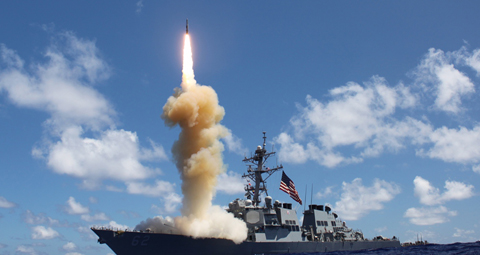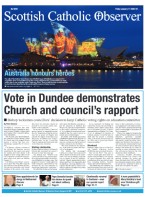BY Ian Dunn | September 29 2017 | ![]() 0 COMMENTS
0 COMMENTS ![]() print
print

Pope urges world leaders to destroy weapons of death
Publication Date: 2017-09-29
The Holy Father joins Scottish Church in raising concerns over North Korea tensions
Pope Francis has urged world leaders to destroy their weapons of mass destruction as fears grow of a nuclear conflict between North Korea and the United States.
The Pope used Twitter to tell global leaders to commit to a world without nuclear weapons by ‘implementing the Non-Proliferation Treaty to abolish these weapons of death.’
There are growing fears that hostile language used by North Korean dictator Kim Jong-Un and US President Donald Trump could spark a nuclear conflict in the Korean peninsula.
James Stavridis, a retired US Navy admiral, said this week: “We are closer to a nuclear exchange than we have been at any time in the world’s history with the single exception of the Cuban missile crisis.”
Archbishop Leo Cushley of St Andrews & Edinburgh Archdiocese warned last month that events on the Korean peninsula make many of us ‘wonder if we’re peering over the abyss in a way that we have not done since I was young.’
Rising tensions
Last weekend the Holy See ratified and signed the new UN Treaty on the Prohibition of Nuclear Weapons, Archbishop Paul Gallagher of Liverpool, the Vatican foreign minister, said the rising tensions over North Korea’s growing nuclear programme are ‘of special urgency.’
“The international community must respond by seeking to revive negotiations,” he said. “The threat or use of military force have no place in countering proliferation, and the threat or use of nuclear weapons in countering nuclear proliferation are deplorable.”
“Nuclear arms offer a false sense of security,” the archbishop added. “Peace and international stability cannot be founded on mutually assured destruction or on the threat of annihilation.”
The treaty, he said, ‘is all the more urgent when one considers contemporary threats to peace—from the continuing challenges of nuclear proliferation to the major new modernisation programs of some of the nuclear weapons states.’
The new treaty signed by the Vatican bans testing, but also bans efforts to develop, produce, manufacture, acquire, possess or stockpile nuclear weapons or other nuclear explosive devices. The United States and other countries possessing nuclear weapons did not take part in the negotiations and do not plan to sign the treaty.
“While having no illusions about the challenges involved in achieving a world free of nuclear weapons, the challenges posed by the status quo and of growing tensions, continuing proliferation, and new modernisation programs, are far more daunting,” Archbishop Gallagher said.
He added that political analysis that relies on nuclear weapons is misleading. The supposed peace based on a balance of power and ‘threats and counter-threats, and ultimately fear’ is ‘unstable and false,’ he said.
He called for the replacement of ‘a logic of fear and mistrust’ with ‘an ethic of responsibility’ that would foster multilateral dialogue and consistent cooperation between all members of the international community.
Lost decades
The archbishop said the Holy See is troubled by the ‘continued lack of progress’ in making sure the treaty enters into force. The two decades since the treaty’s launch have been a lost two decades in achieving ‘our common goal of a world without nuclear weapons.’
“The Holy See welcomes the opportunity to join other states that have ratified the treaty in appealing to remaining states whose ratification is necessary,” he added.
Last year the Scottish bishops again urged the UK Government to take the ‘decisive and courageous step’ of abandoning its nuclear weapons.
“The bishops of Scotland have, for a long time, pointed out the immorality of the use of strategic nuclear weapons due to the indiscriminate destruction of innocent human life that their use would cause,” they said.
“Lives are being lost now because money that could be spent on the needy and the poor is tied up in nuclear arsenals.”










